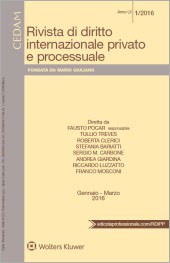Views
Nothing Found
Sorry, no posts matched your criteria
News
Call for abstracts: RIDOC 2020
University of Rijeka, Faculty of Law announces its call for RIDOC 2020: Rijeka Doctoral Conference. This conference has a stong international character and gathers promising law doctoral students, both from Europe and beyond. They will have the oportunity to test their working hypothesis before international panels composed of renown academics. Given the circumstances, the conference is planned as a hybrid online-onsite event or online only. The call may be downloaded here, while programmes of the former conferences are available at this site.
Important dates
Deadline for applications: 25 August 2020.
Information on the acceptance: 25 September 2020.
Conference and book of abstracts: 4 December 2020.
Applications and questions should be addressed to ridoc@pravri.hr.
The Hague Academy of International Law Advanced Course in Hong Kong: First Edition: Current Trends on International Commercial Dispute Settlement
In cooperation with the Asian Academy of International Law, the Hague Academy of International Law will hold its first edition of its Advanced Courses in Hong Kong from 7 to 11 December 2020. The topic will be: “Current Trends on International Commercial Dispute Settlement“.
For this special programme, the Secretary-General of The Hague Academy of International Law has invited leading academics and practitioners from Paris (Professor Diego P. Fernández Arroyo), New York (Professor Franco Ferrari), Bonn (Professor Matthias Weller), Singapore (Ms Natalie Morris-Sharma), and Beijing (Judge Zhang Yongjian) to present expert lectures on the United Nations Convention on International Settlement Agreements Resulting from Mediation, Investor-State Dispute Settlement, international commercial arbitration, settlement of international commercial disputes before domestic courts, and the developments of the International Commercial Court. Registered participants will have pre-course access to an e-learning platform that provides reading documents prepared by the lecturers. At the end of the course, a certificate of attendance will be awarded.
For more information see here.
For the flyer see here.
Rivista di diritto internazionale privato e processuale (RDIPP) No 2/2020: Abstracts
 The second issue of 2020 of the Rivista di diritto internazionale privato e processuale (RDIPP, published by CEDAM) was just released. It features:
The second issue of 2020 of the Rivista di diritto internazionale privato e processuale (RDIPP, published by CEDAM) was just released. It features:
Fernando Gascón Inchausti, Professor at Universidad Complutense de Madrid, Does EU Law Ensure an Adequate Protection of Debtors in Cross-Border Enforcement? (in English)
- From a general perspective, cross-border enforcement of judicial decisions – and of authentic instruments – entails the need to coordinate different procedural systems, interacting with each other. From a practical point of view, however, cross-border enforcement is also a context of dialectic between opposing parties, typical of any judicial process. Its regulation, therefore, must be developed and interpreted taking into account the rights and powers attributed to the creditor and to the debtor, so that the promotion of efficiency – favourable to the creditor – is not detrimental to the debtor’s right of defense. This article assesses the extent to which the civil procedural law of the European Union adequately protects the debtor in cross-border enforcement and, where appropriate, what could be the most reasonable measures to improve it without unduly harming the right of the creditor to a prompt satisfaction of his right. Special attention shall be given in this framework to the legal position of consumers, due to their vulnerability and their special legal status according to EU protective law.
Maria Caterina Baruffi, Professor at the University of Verona, Gli effetti della maternità surrogata al vaglio della Corte di Cassazione italiana e di altre corti (‘Effects of Surrogacy in the Jurisprudence of the Italian Corte di Cassazione? and Other Courts’, in Italian)
- This paper examines the decision by means of which the Italian Supreme Court, in plenary session, on 8 May 2019 dealt with the issue of surrogacy, with particular regard to the notion of international public policy. The Court concluded that the ban on surrogacy constitutes a principle of public order aimed at protecting fundamental values, such as the surrogate mother’s human dignity. This decision is consistent with the advisory opinion given in April 2019 by the European Court of Human Rights, that, upon request of the French Supreme Court in the context of the Mennesson case, ruled that each State can discretionarily determine the modalities by which it guarantees the recognition of the parent-child relationship, including the possibility to adopt. Nonetheless, the difficulties in the application of public policy are apparent and the situations that may arise as a result of such application are equally complex, for instance as a result of genetic ties being established with different persons. Therefore, this paper puts forth new proposals, also in the light of the most recent French case law.
The following comment is also featured:
Roberto Ruoppo, Doctor in Law, Lo status giuridico di Taiwan e i suoi riflessi sul piano internazionalprivatistico (‘Taiwan’s Legal Status and Its Consequences from a Private International Law Perspective’, in Italian)
- This paper focuses on the consequences brought in the field of private international law by the lack of recognition of a State. In particular, the paper aims to understand if it is possible that actors of the international community give effect to the acts and decisions adopted by the authorities of an entity not recognized as a State. Notably, this work addresses the case of Taiwan which, despite the lack of recognition from the others States, owns all the factual requirements to be considered as an autonomous subject in accordance with international law. Relying to the principle of effectiveness and the analysis of precedent case-law – such as those involving the Soviet Union and the German Democratic Republic – this paper aims to demonstrate that the response to this question should be premised on the consideration of the interests involved in the specific case. The conclusion reached is that the acts of an entity which lacks recognition should be given effects in the other States when this is more consistent with the principle of legal certainty and the legitimate expectations of the individuals involved.
In addition to the foregoing, this issue features the following book review by Roberta Clerici, Professor at the University of Milan: J. von Hein, E.-M. Kieninger, G. Rühl (eds.), How European is European Private International Law? Sources, Court Practice, Academic Discourse, Intersentia, Cambridge, 2019, pp. XXVI-373.



